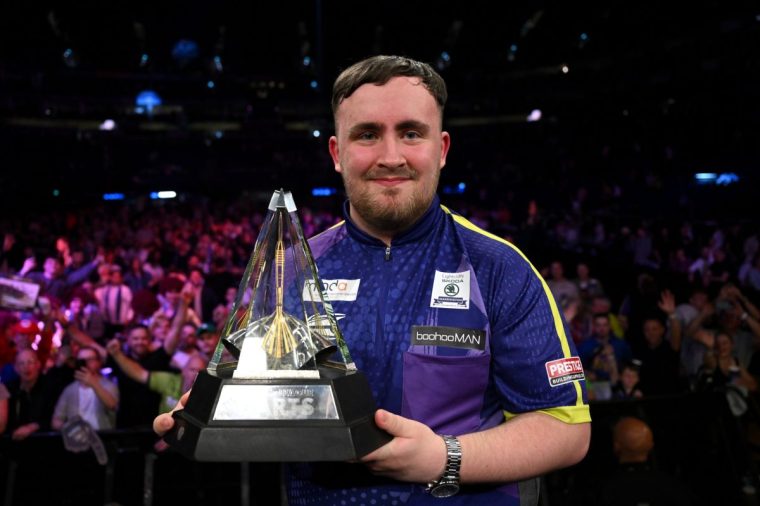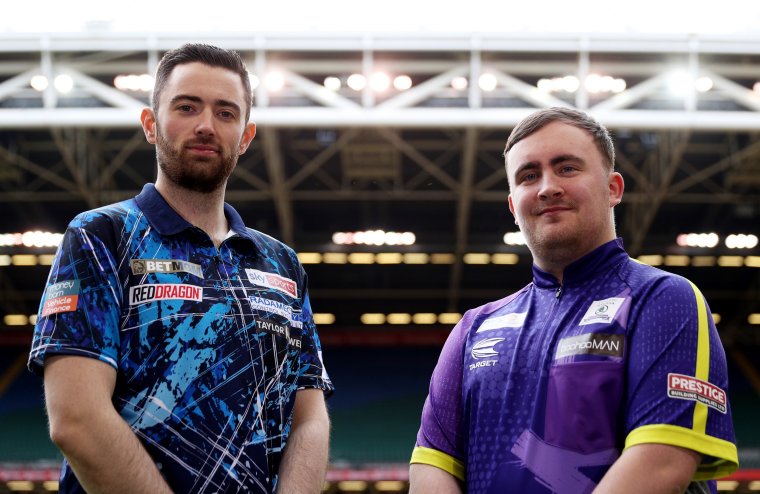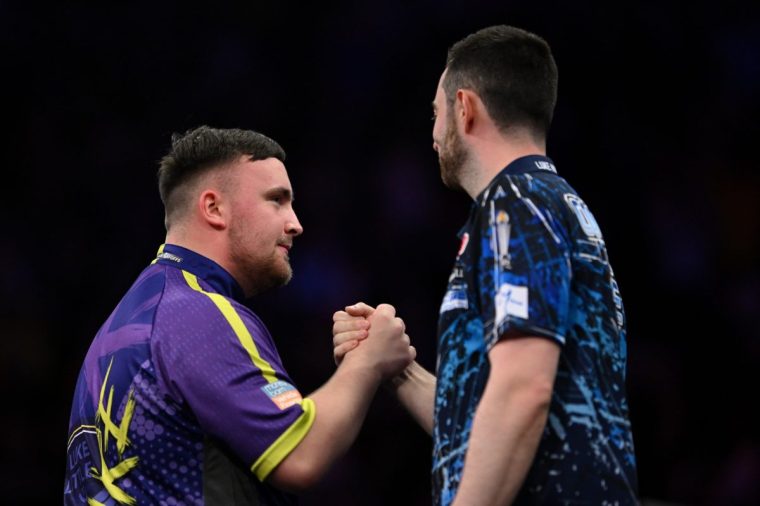Luke Littler is exhausted, we’re told, but that is not a surprise.
His family drove overnight from Minehead Butlin’s on the Somerset coast, scene of his Players Championship final defeat to Luke Humphries, to be in central London for the World Championship draw.
He has since been paraded around a sterile darts-themed bar like a newborn at a family reunion, dragged from podcasts to radio shows to serious interviews with serious journalists.
Of course, exhaustion has become standard for Littler. 4am wake-up calls most weeks for events in Wigan, Leicester, Wolverhampton, or some other glamourous darting stronghold will do that to you.
The same goes for European Tour events in Germany’s nicer post-industrial backwaters.
New York, South Wales, New South Wales. Seventeen nights of the Premier League across seven countries. All of the above often neatly amalgamated into the same fortnight.
And then there’s the media demands, the sponsor requirements, the stress of simply going outside and being Littler, a 17-year-old from Warrington.
He is now the face of National Rail, KP Nuts, Xbox, Boohoo Man, a YouTuber-owned cereal and, perhaps more pressingly, darts.
A kebab and a junior tournament already bear his name, as do a set of Topps trading cards reselling for close to £300.
David Beckham, John Cena and Sir Alex Ferguson have all spoken to and about the boy king and he has driven around Silverstone with Lando Norris.
Littler has won over £1.1m in prize money, 10 PDC titles – three more than any other player – and BBC’s Young Sports Personality of the Year.

He won Google’s Athlete of the Year, with only Kate Middleton and Donald Trump trending higher in 2024.
He has the highest average of any player since July and no man in the world’s top 50 has a winning record against him.
Even world No 1 and world champion Humphries has said Littler’s currently the best.
But, of course, he’s also lost two ranking major finals and been knocked out in the first round of the Grand Prix and European Championship final.
There was the break-up so high-profile he had to publicly ask people to leave his ex-girlfriend alone.
He lost his best friend’s father to prostate cancer, breaking down on stage trying to talk about it.
None of this has been linear or simple or easy.
One phenomenon he has had to adapt to and combat is fame’s tendency to reduce people to a few memorable characteristics.
Michael van Gerwen’s “Kebab Boy” moniker was said in jest, but it summarises his wider public perception – especially among those who believe darts only happens for three weeks a year – quite neatly.
This image reduction is often worse for prodigies, non-consensually bestowed with premature maturity and forced to symbolise some grand sense of youthful possibility, created by others before you get to create yourself.
Which begs the question – who actually is Luke Littler? Does anyone really know? Does he?
It would be vanishingly rare for a teenager to deeply understand themselves, changeable and impressionable entities they tend to be, especially given the quicksand foundations of his fairy tale existence.
To say he has gone from boy to man in the past year would be unfair, but the 17-year-old in a three-piece suit on the SPOTY stage was undeniably more confident and charming than the 16-year-old fed to the world last December.
He doesn’t believe he has changed, but there is good reason for that too.
Two-time world champion Peter Wright once called darts “90 per cent mentality and 10 per cent practice”.

Littler’s mentality is both the primary fuel for his success and an in-built self-defence system to constant variability.
Almost unbearably Zen and stoic, here is Marcus Aurelius in an Under Armor tracksuit, grounded in the present to a remarkable extent.
His manager Martin Foulds deals with the calendar – he just knows he needs to be here, now. Everything else is the future’s problem.
Things happen. Sometimes they may seem good. Sometimes they may seem bad. But more often than not, they’re just things. There will be more. They too may seem bad, or good. Control the controllables. Let everything else just happen to you.
Is he bored of all these interviews?
“It’s just the media, it comes with all the darts that we throw.”
Has he noticed the eyes now following him through every room he enters?
“It’s just something I’ve had to get used to since the World Championship. It all comes with it.”
How does he keep himself sane and functioning?
“I just know that you’ve got to always play well. You’ll win games and you’ll lose games but there’ll always be a setback.”

If you’ve ever read biographies of truly elite athletes, you might recognise this “I just hit the ball over the net and then I won Wimbledon” school of thought.
Never getting too high or too low, free from doubt, able to stave off adrenaline and fear to hit 800 competitive 180s in the past year, and five perfect legs. An instinctive brain for sporting greatness.
Those close to him say in private he is polite, kind, calm, long-suffering, generally uninterested in the trappings of fame. Incredibly easy to work with. In the sweet spot between thoroughly deserving the fame and fortune and not quite believing he does. Still not fully discouraged about the merits of authenticity. Good.
Driving lessons will start soon, because if you wait too long you never get round to it. He could pay a full-time driver, but that is not the point. While his family have moved into a £6,000-per-month home with a pool, he has saved almost all his earnings this year.
On Saturday, Littler will begin his second World Championship as favourite, with 28-year-old former barber Ryan Meikle – nickname “The Barber” – his first obstacle.
If he meets Humphries, increasingly the second half of a dominant darting double act, it will be in the semi-final. While Littler has won the majority of their head-to-heads – seven to six – Humphries has won five of the last seven.
And the older man’s Players Championship final victory may help in forming a coherent blueprint for a second world title. Littler noticeably changed his throwing style three times in Minehead, clearly discomfited by something.
“That was the quickest he’s ever threw,” Littler explained.
“Maybe that’s because he’s confident or whatnot. But because it was a long day, I just slowed my throw down and it helped me a little bit but I just didn’t have enough in the tank to come back.
“Obviously I know he’s throwing quicker, but I think at 6-4, the second break, I just said to myself he’s throwing stupidly quick here, don’t tire yourself out, have that little pause between your throw. Obviously it did help – the 170, 164 checkouts – but I just didn’t have enough in me. He was just on it.”
A glimpse of vulnerability perhaps, and then back to the stoicism – “he was just on it”.
Perhaps only a 17-year-old and a multimillionaire could say that after losing £30,000 and a major trophy.
While Littler will not be both simultaneously, the latter is not an impossibility over the next 50 years.
Perhaps the great marker of his influence is that no young darts players is just a young darts player anymore, they are all potential Littlers, an entire generation trapped in the shadow of someone little older than them.
Twice as many young people in the UK are playing darts now as were a year ago, all with a dream that is his reality.
And so Littler will continue to be exhausted, just as he will continue to be great. The possibilities remain endless, but he knows he just needs to be here, now. Everything else is the future’s problem.



I'm a cafe owner - this is why the £5 coffee is inevitable